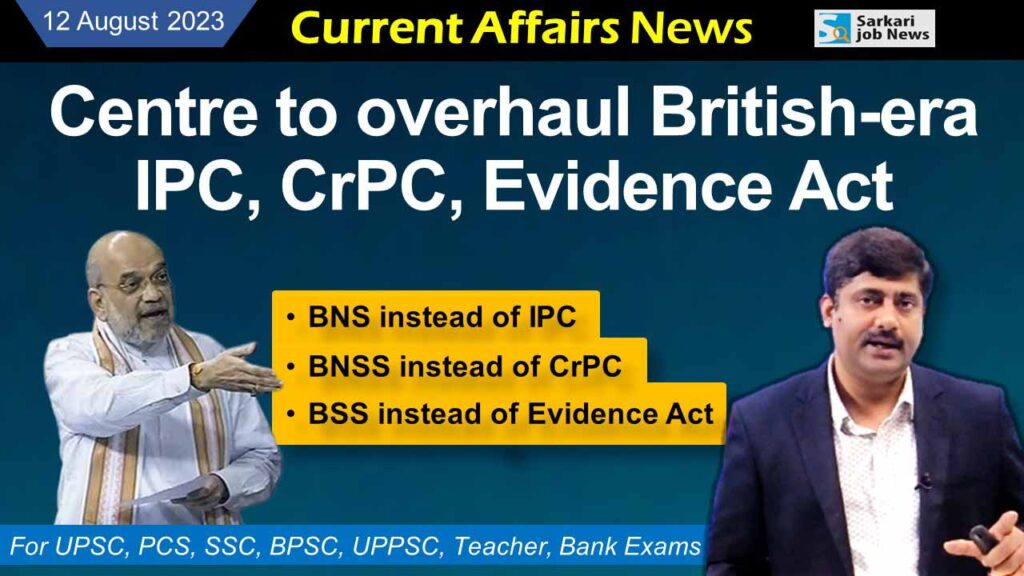This is the current affairs of 12th August 2023. Here are questions and answers of daily current affairs for better preparation of competitive exams for government jobs.
PDF Download: Click here
1. In the bill introduced in the Lok Sabha, there is a provision to implement which ‘Sanhita’ by abolishing the Indian Penal Code (IPC)?
a. Bharatiya Nyaya Sanhita (BNS)
b. Bharatiya Nagrik Suraksha Sanhita (BNSS)
c. Bharatiya Sakshya Sanhita (BSS)
d. Bharatiya Dand Vidhan Sanhita
Answer: a. Bharatiya Nyaya Sanhita (BNS)

Bill Name
– The Bharatiya Nyaya Sanhita Bill, 2023
Note – The draft of the Indian Penal Code was prepared under the chairmanship of Thomas Babington Macaulay, established in 1834 under the Charter Act of 1833. It was prepared based on the recommendations of India’s first Law Commission. This was enacted in India during the British rule in 1862.
—————
2. In the bill introduced in the Lok Sabha, there is a provision to implement which ‘Sanhita’ by abolishing the Code of Criminal Procedure (CrPC)?
a. Bharatiya Nyaya Sanhita (BNS)
b. Bharatiya Nagrik Suraksha Sanhita (BNSS)
c. Bharatiya Sakshya Sanhita (BSS)
d. Bharatiya Dand Vidhan Sanhita
Answer: b. Bharatiya Nagrik Suraksha Sanhita (BNSS)
Bill Name
– The Bharatiya Nagarik Suraksha Sanhita Bill, 2023
—————
3. In the bill introduced in the Lok Sabha, there is a provision to implement which ‘Sanhita’ by abolishing the Indian Evidence Act?
a. Bharatiya Nyaya Sanhita (BNS)
b. Bharatiya Nagrik Suraksha Sanhita (BNSS)
c. Bharatiya Sakshya Sanhita (BSS)
d. Bharatiya Dand Vidhan Sanhita
Answer: c. Bharatiya Sakshya Sanhita (BSS)
Bill Name
– The Bharatiya Sakshya Sanhita Bill, 2023
Sampling without Arrest
– The bill provides for the magistrate to order the collection of samples of his/her signature, handwriting, voice, or fingerprints from any person without arresting them for investigation.
—————
4. On August 11, the last day of the monsoon session, Union Home Minister Amit Shah introduced bills to amend the 163-year-old three fundamental laws in the Lok Sabha.
Replacing these old laws with new laws
– Indian Penal Code (IPC): Bharatiya Nyaya Sanhita (BNS)
– Code of Criminal Procedure (CrPC) : Bharatiya Nagrik Suraksha Sanhita (BNSS)
– Indian Evidence Act: Bharatiya Sakshya Sanhita (BSS)
Bill Sent to Parliamentary Committee
– All three bills will be sent to a parliamentary committee for review. After that, they will be passed in the Lok Sabha and the Rajya Sabha.
————–
5. About Bharatiya Nyaya Sanhita (BNS) Bill, 2023
– There are 511 sections in the IPC, now 356 will remain. 175 sections will be modified. 8 new sections will be added, and 22 sections will be eliminated.
Community Sentencing:
– For minor offenses (such as creating a disturbance under the influence, theft of less than 5,000 rupees), there could be a punishment of 24 hours’ detention or a fine of one thousand rupees, or community service. Such laws exist in the US and UK.
– Currently, jail sentences are imposed for such offenses.
Mob Lynching: Provision for Death Penalty
– If 5 or more people commit murder based on caste, race, or language, they will face a minimum of 7 years and a maximum of life imprisonment or the death penalty.
– Currently, there is no specific law for this. Action is taken under Section 302, 147-148 of the existing laws.
What is the Proposed Sedition Law?
– While presenting the bill, Home Minister Amit Shah stated that the sedition law has been abolished. However, the reality is that it has been presented under a new name.
– Section 150 of the Indian Justice Code, 2023 is related to offenses of sedition. However, the term “sedition” is not used; rather, the offense is described as “endangering the sovereignty, unity, and integrity of India.”
– Now, under Section 150, any act against the nation, whether spoken, written, or conveyed through signs, images, electronic means, can lead to imprisonment from 7 years to life. Endangering the unity and sovereignty of the country will be considered a crime. The term “terrorism” has also been defined.
– Whereas in the old IPC section 124A, sedition is punishable from 3 years to life imprisonment. Although the Supreme Court has repealed this section.
Provision for Strict Punishment for False Identity and Marriage
– Those who engage in sexual relationships by providing false identity, fake promises of marriage, employment, or promotions are now categorized as offenders under this law.
Life Imprisonment for Gang Rape Cases
– The provision for a 20-year sentence or life imprisonment for all gang rape cases, which does not exist today, has been introduced.
– There is also a provision for the death penalty for cases involving girls below 18 years of age.
Imprisonment for Mob Lynching
– For mob lynching, this law includes a provision for a 7-year sentence or life imprisonment, along with the possibility of the death penalty.
Fugitives Will Now Face Punishment
– The law now includes provisions for individuals who remain absent during the trial.
– After the session court judge declares someone a fugitive following the complete legal process, the trial will proceed in their absence, and they will be sentenced.
– No matter where they hide in the world, they will face the consequences. If they want to avoid the punishment, they should seek refuge in the justice system.
Marital Rape Still Not a Crime
– Section 375 of the Indian Penal Code mentions laws related to rape. However, it includes a exception stating that if a husband engages in sexual intercourse with his wife, who is not under 15 years old, it won’t be considered rape. Changes are now being made to this.
– In the new law, ‘the wife’s age should not be less than 18 years.’ To put it simply, if a husband engages in sexual relations with his wife, her age must be at least 18 years. In this way, if you look at it, the new provision is on par with the POCSO Act.
– In this situation, marital rape still won’t be considered a crime.
Conditions on Pardoning Punishments
– The death penalty can now be commuted to life imprisonment or a maximum of 7 years in prison.
– This will ensure that individuals with political influence cannot evade the law.
– Without listening to the government, cases with 7 years or more imprisonment cannot be withdrawn by the victim.
—————
6. About Bharatiya Nagrik Suraksha Sanhita (BNSS) Bill, 2023
– There will be 533 sections remaining in the CrPC. 160 sections will be modified, 9 new sections will be added, and 9 will be eliminated. A provision will be introduced for conducting video conferences from interrogation to trial, which was not present before in the Code of Criminal Procedure.
The Trial Court Must Deliver Verdict within 3 Years
– The biggest change is that now the trial court must deliver every verdict within a maximum of 3 years.
– There are 50 million pending cases in the country.
– Out of these, 44.4 million cases are in the trial courts.
Use of Handcuffs
– Police officers may be allowed to use handcuffs while arresting a person if they are habitually involved in crimes, have escaped from custody, or have committed organized crime, terrorist activities, crimes related to narcotics, illegal possession of weapons, murder, rape, acid attacks, counterfeit currency, human trafficking, sexual offenses against children, or crimes against the state.
Permission to Prosecute Public Servant
– The decision to grant or reject permission to prosecute a public servant must be made by the government within 120 days of receiving the request.
– If the government fails to do so, it will be deemed as permission granted.
– No permission is required in cases of sexual offenses, trafficking, etc.
—————
7. When is World Elephant Day celebrated?
a. 12 August
b. 10 August
c. 09 August
d. 08 August
Answer: a. 12 August

– The aim of this day is to educate and raise awareness about Asian and African elephants.
– It was first celebrated as International Elephant Day on August 12, 2012.
– It’s worth mentioning that about 60 percent of the world’s Asian elephants are found in India.
– In the country, the first elephant census was conducted in 2017, during which around 30,000 elephants were estimated to be living in the forests.
————-
8. When is International Left-Handers Day celebrated?
a. 13 August
b. 12 August
c. 11 August
d. 10 August
Answer: a. 13 August
– International Left-handers Day is observed every year on August 13th.
– It is celebrated to recognize the uniqueness of left-handed individuals and to celebrate differences of opinion.
– This day was first observed in 1976 by Dean R. Campbell, the founder of Left-handers International, Inc.
—————
9. When is World Organ Donation Day celebrated?
a. 14 August
b. 13 August
c. 12 August
d. 11 August
Answer: b. 13 August
– World Organ Donation Day is observed on 13 August to spread awareness about the importance of organ donation.
Note – National Organ Donation Day is celebrated in India on 27 November.
—————
10. Which country objected to the use of the Sanskrit verse ‘Vasudhaiva Kutumbakam’ in the G-20 logo?
a. China
b. Japan
c. USA
d. Germany
Answer: a. China

– It has been reported in the media that China is the only country that opposes the use of this slogan. Russia has also not supported China on this issue. However, Russia has been objecting to the language being used in reference to Ukraine in the documents related to the J-20.
– The Hindu newspaper has cited several diplomatic sources to explain that for the past few weeks, Indian and Chinese negotiators have been entangled in several issues, including the matter of using Sanskrit.
– The Ministry of External Affairs of the Indian government, while defending the use of the Sanskrit verse ‘Vasudhaiva Kutumbakam’ in the J-20’s logo, has stated that they are only using the English translation of this verse – “The world is one family” – in their documents and statements.
– Vasudhaiva Kutumbakam is a Sanskrit phrase that translates to “The world is one family.”
China expressed objection during the Goa meeting
– Several media reports claimed that after China’s entry into the Energy Transition Ministers Meeting (ETMM) in Goa, the Sanskrit verse was removed.
– When India’s Ministry of External Affairs spokesperson, Arindam Bagchi, was asked about this, he stated, “The working language of J-20 is English.”
– Arindam Bagchi, the spokesperson of the Ministry of External Affairs, stated, “The theme of J-20, being conducted under India’s chairmanship, is ‘One Earth, One Family, One Future.’ It is based on our civilizational ethos of Vasudhaiva Kutumbakam and has garnered broad support. It is part of the many initiatives that India has included in the J-20 agenda.”
—————-
11. Renowned nuclear physicist Bikash Sinha passed away on 11 August 2023, which award had he received?
a. Padma Vibhushan
b. Padma Bhushan
c. Padma Shri
d. both b and c
Answer: d. both b and c (Padma Bhushan and Padma Shri)

– He died at the age of 78.
– He received the Padma Shri in 2001 and the Padma Bhushan in 2010.
– Took charge as the Director of Saha Institute of Nuclear Physics till 2009.

